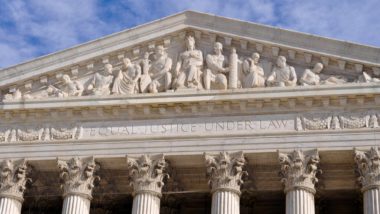Top Class Actions’s website and social media posts use affiliate links. If you make a purchase using such links, we may receive a commission, but it will not result in any additional charges to you. Please review our Affiliate Link Disclosure for more information.

Texas’ new restrictive abortion law, known as the “Texas Heartbeat Act,” has been a fixture in the news since it went into effect in September — not just for the sweeping limits it places on abortions for Texans and arguments that it violates Supreme Court precedent, but also for the unique way in which the law is implemented.
The law, also known as SB8, effectively deputizes ordinary citizens into enforcing a ban on abortions as early as six weeks by incentivizing them with a cash reward for successfully suing anyone who helps facilitate an illegal abortion.
In September, two individuals filed separate legal claims against an OBGYN in San Antonio under Texas’ new abortion law against Dr. Alan Braid, who had written an essay in the Washington Post where he confessed to performing an abortion on a patient after the state’s abortion ban had taken effect. The lawsuits were the first instances of civil claims filed under the law.
The abortion law itself has faced two separate legal challenges, one brought on by a coalition of abortion care providers (which was dismissed) and the other brought by the U.S. Department of Justice on behalf of the federal government (currently ongoing).
But as the law’s constitutionality is challenged, can we expect more civil claims under the law while it exists? And could there be grounds for class action?
First, it’s important to understand the unusual nature in which the Texas abortion law was written. It bans abortions on pregnancies after “cardiac activity is detected” even in instances of rape or incest. Cardiac activity from a fetus is typically detectable at about the six-week pregnancy mark — around the time a person typically finds out they are pregnant. Medical experts and reproductive justice advocates argue that stipulation makes SB8 an all-out abortion ban; if a person wanted to then terminate their pregnancy, it would already be too late.
Secondly, the bill allows any individual to bring a civil lawsuit against an entity who “aid or abets” in an abortion procedure or inducement, for damages of at least $10,000. Since the term “aid or abets” isn’t defined clearly in the law, the implication is far-reaching — anyone in Texas, from a person who donates to an abortion fund to a doctor who performs a procedure, could be sued under the statute.
But individuals cannot sue someone who had an abortion, only those who supported them. There is also no enforcement by government officials, only a bounty-style reward that can be claimed by civilians. This component has allowed SB8 to avoid landing in court under review as a violation of the Supreme Court’s 1973 ruling in Roe v. Wade, which established abortion care as a protected right under the Constitution.
However, legal experts and reproductive justice advocates argue the law is, regardless of that enforcement component, unconstitutional under Roe v. Wade.
“If this were not about abortion, I think it’s fairly straightforward. The Texas law absolutely violates current Supreme Court precedent,” said Carolyn Shapiro, a law professor at the Chicago-Kent College of Law under the Illinois Institute of Technology. “Some people think that precedent is wrong and should be overruled, but that hasn’t happened yet. So certainly, until it is overruled…SB8 is unconstitutional.”
Ironically, the civil claims against Dr. Braid provide abortion rights advocates an opportunity to challenge the law’s constitutionality in the lower courts, something that anti-choice supporters may have hoped to avoid. According to legal experts, the law’s anti-choice proponents sought to create a chilling effect on abortion care providers, rather than intending the law for actual use, which is why the law was written to avoid judicial scrutiny in the courts.
“Once somebody files and it’s being litigated that’s another opportunity for this case,” said Shapiro, noting Dr. Braid could put forth the argument that he did not comply with Texas’s abortion law because it is unconstitutional. “He can offer that as a defense and, undoubtedly, that’s what he was hoping would happen when he wrote his op-ed piece.”
Plaintiffs in both cases against Dr. Braid said they were not aligned with the anti-abortion movement and admitted the reason for their claims was to test SB8’s legal standing. Texas Right to Life, the state’s largest anti-abortion group and the primary lobbyist behind the abortion law, criticized both cases as “self-serving legal stunts.”
Separately, on Oct. 6, U.S. District Judge Robert Pitman ordered a temporary suspension of SB8 while the DOJ’s lawsuit against Texas is ongoing. “From the moment SB8 went into effect, women have been unlawfully prevented from exercising control over their lives in ways that are protected by the Constitution,” Pitman wrote in his opinion. “That other courts may find a way to avoid this conclusion is theirs to decide; this Court will not sanction one more day of this offensive deprivation of such an important right.”
During the 48-hour suspension, some abortion providers resumed services for patients despite the risk they could still be sued if the law returned after its temporary block. The famously conservative Fifth U.S. Circuit Court of Appeals ultimately put out an administrative block as it deliberated on the state’s appeal against the injunction, before granting a stay which put SB8 back into effect.
Texas Right to Life, the anti-abortion group, told the press they received a number of reports on SB8 violations following Judge Pitman’s temporary block, but said they “don’t have any credible evidence at the moment of litigation that we would bring forward.”
Whole Woman’s Health, which operates four clinics in the state, was among the healthcare providers that resumed abortion services during the law’s suspension. A spokesperson for Whole Woman’s Health confirmed to Top Class Actions that the organization is represented by lawyers at the Center for Reproductive Rights — also representing Braid in his civil suits — but did not respond to questions regarding legal claims against the organization. It seems the potential for future claims, whether as legitimate anti-abortion efforts or not, exists so long as SB8 is still in effect.
Class actions related to the law, meanwhile, are also possible but unlikely.
“To the extent of something this broad, relief would be on the basis of a constitutional challenge,” said Daniel Karon, a Cleveland-based attorney who has represented both plaintiffs and defendants in class action lawsuits. “If it’s declared unconstitutional to one person, it’s unconstitutional to everybody. Laws necessarily affect a lot of people, it doesn’t mean there’s a class action angle.”
A class action for abortion litigation needs to get past a few technical hurdles, including meeting the class certification and determining a party to sue. If a group of pregnant people affected by the abortion law wanted to launch a class action—in the off chance they could get class certified in the first place— for example, they still would not be able to sue the Texas government over SB8 due to “sovereign immunity.”
“Even if you have a class, if you don’t have a defendant…you’re still not going to get very far,” Shapiro said.
For now, legal observers and advocates are waiting to see what happens to other abortion cases that will go before the Supreme Court, which in turn could determine SB8’s legal standing. Most notably, the Supreme Court is set to hear arguments in Dobbs v. Jackson Women’s Health Organization on Dec. 1. The case pertains to a Mississippi law that, with limited exceptions, bans abortions on pregnancies later than 15 weeks. The ruling on the case will determine whether constitutional protections on abortions, which are now banned in Texas, may continue.
[getsocial app=”sharing_bar”]
Don’t Miss Out!
Check out our list of Class Action Lawsuits and Class Action Settlements you may qualify to join!
Read About More Class Action Lawsuits & Class Action Settlements:
ATTORNEY ADVERTISING
Top Class Actions is a Proud Member of the American Bar Association
LEGAL INFORMATION IS NOT LEGAL ADVICE
Top Class Actions Legal Statement
©2008 – 2024 Top Class Actions® LLC
Various Trademarks held by their respective owners
This website is not intended for viewing or usage by European Union citizens.















2 thoughts onThe complicated lawsuits over the Texas abortion law, explained
I remain speechless re: reversal of Roe v. Wade but the layers in this law that not only allows for ordinary citizens to “police” the law, but actually incentives people to do so is destructive and discriminatory. What’s the rational for the bounty? Given that abortion is a woman’s rights issue, the bounty (being more of a social experiment and is unprecedented on a single-sex issue, i.e. against woman) serves to further oppress & control women as 2nd class citizens yet provides a way to punish all who support woman’s rights and equality. Further, I feel that the bounty has a hidden message that domestic violence is acceptable for men to beat and abuse women. I support this action and want to be a part of the challenge on behalf of women’s rights and equality.
Please add me